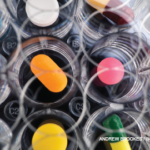 Phase 3 Trial of Ixekizumab & Adalimumab in bDMARD-Naive Patients with Active PsA
Phase 3 Trial of Ixekizumab & Adalimumab in bDMARD-Naive Patients with Active PsA
Ixekizumab is an investigational IgG4 monoclonal antibody that binds with high affinity and specificity to cytokine IL-17A. In this 24-week, double-blind, placebo-controlled, Phase 3 clinical trial, adult patients with active psoriatic arthritis (PsA) who were naive to biologic disease-modifying anti-rheumatic drugs (bDMARDs) (n=417) were randomized into four treatment groups: placebo (n=106); 40 mg adalimumab once every two weeks, which was the active control (n=101); 80 mg ixekizumab once every two weeks after receiving an initial 160 mg dose at Week 0 (n=103); or 80 mg ixekizumab once every four weeks after receiving an initial 160 mg dose at Week 0(n=107).1
Three hundred and eighty-two patients completed the study. A significantly greater percentage of patients taking 80 mg ixekizumab once every two weeks or 80 mg ixekizumab once every four weeks achieved ACR20, ACR50, ACR70 and PASI 75/90/100 responses than placebo-treated patients at Weeks 12 and 24 (p<0.01). At Week 24 for placebo, 40 mg adalimumab once every two weeks, 80 mg ixekizumab once every two weeks and 80 mg ixekizumab once every four weeks, respectively, the ACR20 was 30%, 57%, 58% and 62%; the ACR50 was 15%, 39%, 40% and 47%; and the ACR70 was 6%, 26%, 23% and 34%. The PASI 100 response was 3% for placebo, 24% for 40 mg adalimumab once every two weeks, 43% for 80 mg ixekizumab once every two weeks and 53% for 80 mg ixekizumab once every four weeks.
Measures of dactylitis (LDI-B) showed significant reductions for both ixekizumab groups compared with placebo. At Week 24, the incidence of treatment-emergent adverse events and the rate of serious adverse events in patients were higher with adalimumab and ixekizumab compared with placebo-treated patients. Discontinuations due to adverse events were also similar across treatment groups. No deaths occurred.
Does Treatment of Severe, Progressive RA Improve Outcomes?
A Phase 3 study, known as C-EARLY, evaluated disease-modifying anti-rheumatic drug (DMARD)-naive patients with severe, active, progressive rheumatoid arthritis (RA), assessing the efficacy and safety of certolizumab pegol plus methotrexate compared with placebo plus methotrexate to induce and maintain a sustained clinical response and inhibit radiographic damage. This trial was a multicenter, double-blind, randomized study in patients with an RA diagnosis of less than one year who met the 2010 ACR/EULAR criteria and other relevant specifications.2
Patients (n=879) were randomized 3:1 to receive certolizumab pegol (400 mg at Weeks 0, 2 and 4; and 200 mg every two weeks to Week 52) plus methotrexate or placebo plus methotrexate once every two weeks. Methotrexate was started as a 10 mg weekly dose and increased up to a 25 mg weekly dose by Week 8. Patients unable to tolerate ≥15 mg of methotrexate by Week 8 were withdrawn from the study. A greater proportion of certolizumab pegol plus methotrexate-treated patients compared with placebo plus methotrexate treated-patients had improvements in RA signs and symptoms, and inhibition of structural damage.



